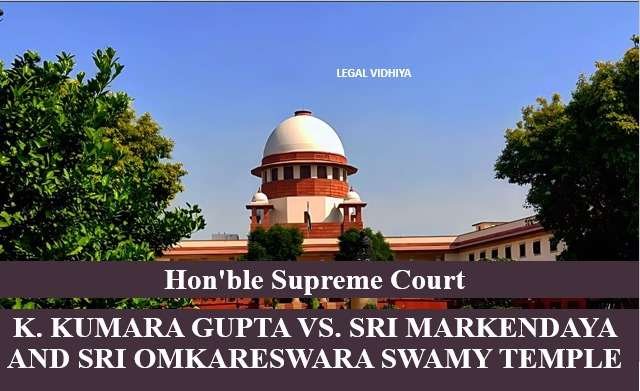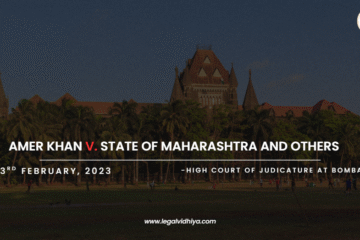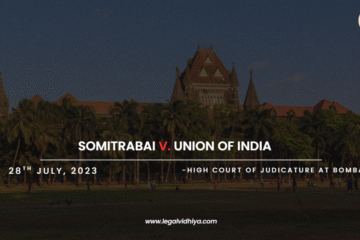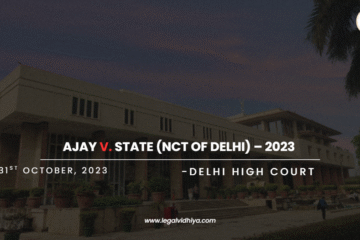
| Citated Judgements | Eva Agro Feeds Private Limited Vs. Punjab National Bank, Celir LLP Vs. Bafna Motors (MUMBAI) PVT. LTD |
| Date of Judgment | 18th February,2022 |
| Court | Supreme Court of India |
| Case Type | Civil |
| Appellant | K. Kumara Gupta |
| Respondent | Sri Markendaya And Sri Omkareswara Swamy Temple |
| Bench | Justice Mr. Shah and Justice Ms. BV Nagrathna |
| Referred Judgement | Ram Umeshwari Suthoo V. Member, Board of Revenue, Orissa |
FACTS OF THE CASE
A notable case unfolded concerning the auction of a piece of land belonging to Sri Markendaya and Omkareswara Swamy Devasthanam in Eluru. The saga commenced with a proposal from the office of the Commissioner, Endowments Department, published on 10.03.1997, indicating the intent to auction the said land. The notification further echoed through the pages of the Andhra Pradesh Gazette on 22.05.1997, setting the stage for a significant development.
The proposed auction encompassed an expanse of approximately 1.81 acres, and the anticipated value was fixed at Rs. 4,00,000/- per acre. The Commissioner of the Endowments Department gave the green light to proceed with the sale. The Executive Officer of the Temple Trust subsequently issued a tender/public notice to auction the land openly, with the event slated for 22.05.1998. The auction itself unfolded on 24.06.1998, witnessing the participation of 45 individuals. Among them, the appellant emerged victorious, securing the position of the highest bidder. However, the narrative took an unexpected turn when L. Kantha Rao, a non-participant in the auction, filed a Writ Petition in 1999 before the High Court. Rao sought to direct the Executive Officer and the Temple Committee not to execute the sale deed for the auctioned land. In response, the High Court issued an interim stay on further proceedings, conditional on Rao furnishing a bank guarantee of Rs. 30 lakhs within two weeks.
Amidst these legal maneuvers, the Commissioner, Endowments Department, unilaterally issued an order on 10.02.1999, canceling the auction held on 24.06.1998. This decision prompted the Executive Officer to organize a re-auction, with the upset price now set at Rs. 30 lakhs. The legal tussle found its way back to the High Court, which noted that although the Commissioner had revoked the order from February 1999, the revision against it had become irrelevant. However, the court granted Rao the liberty to file a revision against the original order. Building on this legal latitude, Rao filed a revision before the Government challenging the order dated 22.12.1998, even though he had not participated in the initial
auction where the appellant emerged as the highest bidder. Astonishingly, the revision was allowed, leading to the nullification of the order dated 22.12.1998. The Commissioner was directed to refund the amount paid by the appellant and conduct a re-auction of the land.
Undeterred, the appellant sought recourse through a writ before the Single Judge bench of the High Court. The Single Judge held that Kantha Rao lacked locus standi, emphasizing that he had not participated in the tender-cum-auction. The judgment underscored that when 45 individuals took part in the process, Rao had the opportunity to join but refrained. The court dismissed the argument that merely depositing money with the expectation of a higher return was insufficient, unless malafides or fraud by the vendor or vendee were established.
However, the legal pendulum swung again when the Division Bench of the High Court set aside the Single Judge’s decision. The Division Bench directed the authorities to conduct a re- auction of the entire land, advocating for an upset price higher than the previous one. The reasoning behind this was the elapsed time since the issuance of GO Rt. No. 1808 dated 26.11.1999 and the observed increase in the land’s value over more than two decades. In a bid to ensure fairness, the Division Bench also ruled that both the writ petitioner (Kantha Rao) and the appellant should be allowed to participate in the re-auction, provided they met the eligibility criteria. Thus, the legal odyssey of the contested land auction continued, navigating through the twists and turns of administrative decisions, judicial reviews, and the quest for equitable resolution.
ISSUES
Can the sale from a public auction be cancelled because offers were made by other people or third parties?
ARGUMENTS
The court looked into the details of the situation and noticed that the High Court Division Bench missed understanding that L. Kantha Rao wasn’t being honest. Rao didn’t join the auction in 1998 or make any offers, so the court said he shouldn’t have been allowed to complain later about how much the land was worth. The court stressed that once the person who went to court (the appellant) was chosen as the top bidder in a fair auction where 45 people participated, and the sale was confirmed with all the necessary paperwork, it couldn’t be cancelled unless there was clear cheating or fraud.The court criticized Rao for not bringing up any concerns at the right time, which made it seem like he didn’t really have a genuine complaint about the auction. The court also criticized the Division Bench (a group of judges) for not realizing the hidden plan behind filing a PIL (Public Interest Litigation) to mess up the auction. The court pointed out that any problems with how the decision was made should have been dealt with using the proper legal methods, not by filing a petition under Article 226 of the Constitution.
Lastly, the court mentioned that more than 23 years had passed since the auction, and the land’s value wouldn’t be the same as it was in 1998. So, the important thing to think about is how much the property was worth when it was sold. The court said that the people who went
against the auction (the respondents) couldn’t show any proof that the amount offered by the appellant in 1998 wasn’t a fair value.
Then the court carefully looked at what happened and found that the High Court made a mistake by not understanding that Kantha Rao wasn’t being truthful. Rao didn’t take part in the auction or make any offers, so the court said he shouldn’t complain later about the land’s value. The court also said that once the person who went to court (the appellant) was chosen as the top bidder in a fair auction, and the sale was confirmed, it couldn’t be canceled unless there was cheating. The court didn’t like that Rao didn’t raise concerns at the right time, and they criticized the judges for not realizing the hidden plan behind filing a PIL to mess up the auction. The court also noted that a lot of time had passed since the auction, so what matters is how much the land was worth when it was sold. The court said that the people who went against the auction couldn’t prove that the amount offered in 1998 wasn’t fair.
JUDGEMENTS
The Supreme Court made it clear that unless there was something seriously wrong or illegal in how the auction was conducted, and if forgery or cheating had damaged the auction irreparably, the sale couldn’t be cancelled. They pointed out that the person filing the case had won in a fair auction with 45 participants, and once the sale was confirmed and the paperwork was done, it couldn’t be undone. The court also said there was no proof that the land was worth much more in 1998 or that the winning bid was less than the land’s actual value.
In rejecting the High Court’s decision, the Supreme Court referred to a previous case, State of Uttaranchal Vs. Balwant Singh Chaufal and Ors., which urged High Courts to be cautious when dealing with public interest petitions. The court in that case emphasized that genuine and honest public interest cases should be encouraged, while those with hidden motives should be discouraged. They said that before accepting such cases, the court should check if the person filing the petition is sincere, make sure the petition has accurate information, and be confident that there is substantial evidence supporting the claims.
Furthermore, the Supreme Court stressed the need to discourage people from filing cases for personal gain or with ulterior motives. They suggested imposing special fees or other measures to prevent fake applications and petitions filed for wrong reasons. In essence, the court emphasized the importance of ensuring that legal processes are not misused for personal or dishonest purposes, promoting a fair and just legal system.
The court said that unless there are serious issues like cheating, secret plans, or illegal activities, the highest bid in a public auction is usually seen as a fair price. The judges, MR Shah and BV Nagarathna, explained that without these problems, the public auction wouldn’t be reliable or trustworthy. They emphasized that for a public auction to be meaningful, it’s crucial that it happens fairly without any shady dealings. The court essentially stressed the importance of transparency and fairness in public auctions to ensure that the highest bid represents a fair market value under normal circumstances.
REFERENCES
https://www.the-laws.com/Encyclopedia/browse/Case?CaseId=002202181000&Title=K.- KUMARA-GUPTA-Vs.-SRI-MARKENDAYA-AND-SRI-OMKARESWARA-SWAMY- TEMPLE
https://www.lawyersclubindia.com/judiciary/sale-pursuant-for-public-auction-allocate- listening-to-the-third-parties-k-kumara-gupta-v-sri-markandeya-and-sri-omkareshwara- temple-5764.asp
This article is written by Taniya Porwal of Lloyd School of Law, Intern at Legal Vidhiya.
Disclaimer: The materials provided herein are intended solely for informational purposes. Accessing or using the site or the materials does not establish an attorney-client relationship. The information presented on this site is not to be construed as legal or professional advice, and it should not be relied upon for such purposes or used as a substitute for advice from a licensed attorney in your state. Additionally, the viewpoint presented by the author is of a personal nature.




0 Comments